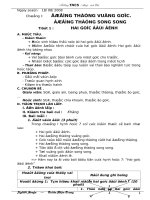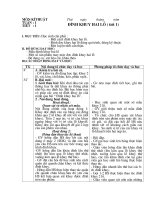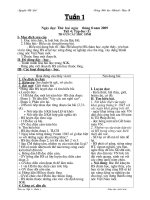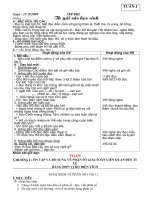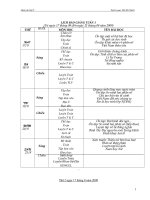- Trang chủ >>
- Mầm non - Tiểu học >>
- Lớp 5
5 2 1 using special talents TG
Bạn đang xem bản rút gọn của tài liệu. Xem và tải ngay bản đầy đủ của tài liệu tại đây (119.64 KB, 4 trang )
Using Special Talents
5.2.1
COMPARE AND CONTRAST
ANSWER QUESTIONS
SUMMARY
READ THE BOOK
LESSON VOCABULARY
SET PURPOSE Have students set a purpose
for reading Using Special Talents. Students’
interest in learning more about how to help
others should guide their purpose. Based on
their preview, they might also want to know
what the kids in the illustrations did to help
others.
This book follows the action of
several children who want to help others and
gives useful information on ways that readers
can also help their community.
caterpillar
disrespect
migrant
unscrewed
cocoon
emerge
sketched
INTRODUCE THE BOOK
INTRODUCE THE TITLE AND AUTHOR
Discuss with
students the title and the author of Using
Special Talents. Based on the title and the
cover art, what do they think the book will be
about? How might the book relate to a social
studies topic?
BUILD BACKGROUND
Ask students to discuss
experiences and knowledge of fundraising
or volunteering time to help others. Take
suggestions of ways that kids their age can
help others. Let students know they will be
learning more about this topic in Using Special
Talents.
PREVIEW/USE TEXT FEATURES
As students
preview the book, draw their attention to the
charts on pages 11 and 18. Discuss that the
charts present information on ways to help
others. Also note that the captions throughout
the book give additional information that can
help students better understand the topic.
STRATEGY SUPPORT: ANSWER QUESTIONS Remind
students that there are four methods of
finding answers to questions. The answers
might come from one sentence, from several
sentences throughout the text by using the
text plus prior knowledge, and by using just
prior knowledge. Have students read page
4. Then ask them where they can get the
information to answer the question: What
did Harriet Hanson do to help other children?
(The answer can be found in several sentences
throughout the page.) As students answer the
following comprehension questions, have them
tell you how they came up with the answers.
COMPREHENSION QUESTIONS
PAGE 11
Compare the different categories of
the chart. Which one interests you the most?
Why? (Responses will vary.)
PAGE 13 What does Annie do to raise money?
Where did you find the answer? (bakes; text
plus prior knowledge)
PAGES 15–17
Why do you think the author
chose to use Lee as an example of a kid
volunteer? (Responses will vary but should
show understanding that the author might be
saying that if you are confused about what to
do, there are ways to find information, and it is
okay to be nervous about volunteering.)
PAGES 20–22
What did Hallanah do to find out
more information for her Web site? (did online
research, called and talked to many people)
32
Using Special Talents
16917_LRD_TG_032-033 32
12/28/05 1:12:10 PM
REVISIT THE BOOK
READER RESPONSE
1. Possible Responses: Alike: did research
before deciding what to do; worked directly
with people. Different: Different goals—one
helped a family, other helped a scientist.
2. Responses will vary.
3. Disrespect contains the prefix dis-.
Unscrewed contains the prefix un-. Dismakes the base word negative. Un- reverses
or undoes the meaning of the base word.
4. Responses will vary.
EXTEND UNDERSTANDING
Have students revisit
the headings in the book. Discuss the following: Did the headings help the students
organize and remember information? Did they
make it easier for a student to go back, find,
and reread information? Did students find
the headings compelling, or can they think of
headings they might like better?
RESPONSE OPTIONS
SPEAKING
Have students pick one of the
children in the book to role-play. Staying in
character, students should explain how they
help others and why they chose to do it.
Students can adlib information to round out
their characters.
Use illustrations from the book,
visual aids in the classroom, drawings, and
gestures to explain words which students
do not understand.
SOCIAL STUDIES
CONNECTION
Using the information
found in the book and
online sources, encourage students
to research volunteer opportunities and
different volunteer organizations. Invite them
to share their information with others in
the class.
Skill Work
TEACH/REVIEW VOCABULARY
Have pairs of students create vocabulary
word cards. Instruct one partner to hold up
a card while the partner gives the definition.
Students can use the glossary to check
the definitions. Students should play until
partners have correctly defined all words.
TARGET SKILL AND STRATEGY
COMPARE AND CONTRAST Remind students that to compare is to tell how two or
more things are alike. To contrast is to tell
how two or more things are different. Tell
students that as they read, they should think
about the many ways that kids can help others. How are some volunteering opportunities alike and different? Which ideas involve
raising money? Which include volunteering
time to work with others?
ANSWER QUESTIONS
Remind students that
answering questions is providing complete
and correct responses to questions asked
by others. Explain that to answer some
questions, students will need to compare
information. They might also compare what
they read to what they already know. Review
the compare-and-contrast organizer on the
inside back cover; advise students that they
will fill it in after reading. They will need to
use information from the book and might
choose to use prior knowledge as well.
ADDITIONAL SKILL INSTRUCTION
AUTHOR’S PURPOSE Remind students that
an author’s purpose can be to inform,
to persuade, to entertain, or to express
feelings. Based on their previews, ask
students what they think the author’s
purpose is for Using Special Talents. Revisit
their answers after students have finished
reading the book. Do they want to change
their opinion about the author’s purpose?
Why or why not?
Using Special Talents
16917_LRD_TG_032-033 33
33
12/28/05 1:12:11 PM
Using Special Talents
Name
Compare and Contrast
• To compare is to tell how two or more things are alike.
• To contrast is to tell how two or more things are different.
Directions Read the following sentence from Using Special Talents.
In contrast to Annie, Miguel, and Lee, Hallanah is an experienced volunteer.
1. Think about all the different children you read about in Using Special Talents. What is one thing
they all have in common?
2. How does Hallanah differ from Annie, Miguel, and Lee?
3. What clue words tell that Hallanah is being compared to Annie, Miguel, and Lee?
4. Make a list of your own interests and talents.
© Pearson Education 5
5. Compare your list to the activities on the chart on page 11 of Using Special Talents. Based on
your comparison, which activity would you like to do most. Why?
34
16917_LRD_TG_034-035 1
12/28/05 1:13:10 PM
Using Special Talents
Name
Vocabulary
Directions Choose the word from the box that best matches each definition. Write the word on the line.
Check the Words You Know
caterpillar
migrant
cocoon
sketched
disrespect
unscrewed
emerge
1.
to come out of
2.
the opposite of respect
3.
an insect
4.
where a caterpillar turns into a butterfly
5.
traveling from one place to another
6.
past tense of twisting something off
7.
something an artist might have done to make a quick drawing
Directions Write three sentences using one vocabulary word in each.
8.
9.
© Pearson Education 5
10.
35
16917_LRD_TG_034-035 2
12/28/05 1:13:11 PM


